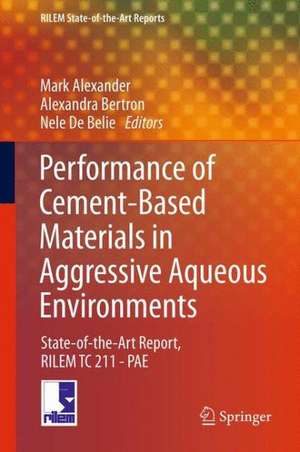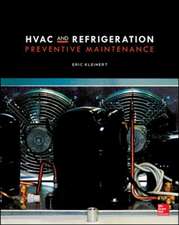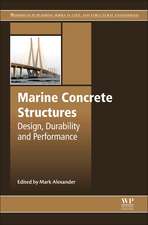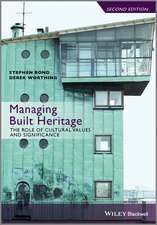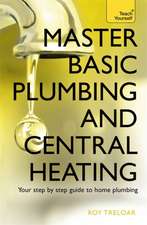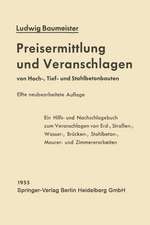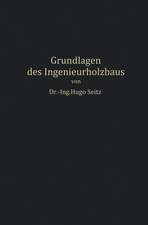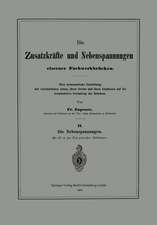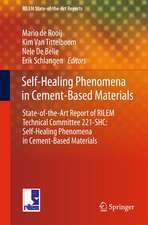Performance of Cement-Based Materials in Aggressive Aqueous Environments: State-of-the-Art Report, RILEM TC 211 - PAE: RILEM State-of-the-Art Reports, cartea 10
Editat de Mark Alexander, Alexandra Bertron, Nele De Belieen Limba Engleză Hardback – 18 dec 2012
The focus of this book is on addressing issues concerning performance of cement-based materials in aggressive aqueous environments , by way of this State-of-the-Art Report. The book represents the work of many well-known and respected authors who contributed chapters or parts of chapters. Four main themes were addressed: I. Nature and kinetics of degradation and deterioration mechanisms of cement-based materials in aggressive aqueous environments, II. Modelling of deterioration in such environments, III. Test methods to assess performance of cement-based materials in such environments, and which can be used to characterise and rate relative performance and inform long term predictions, IV. Engineering implications and consequences of deterioration in aggressive aqueous environments, and engineering approaches to the problem.
| Toate formatele și edițiile | Preț | Express |
|---|---|---|
| Paperback (1) | 953.20 lei 6-8 săpt. | |
| SPRINGER NETHERLANDS – 29 ian 2015 | 953.20 lei 6-8 săpt. | |
| Hardback (1) | 967.08 lei 6-8 săpt. | |
| SPRINGER NETHERLANDS – 18 dec 2012 | 967.08 lei 6-8 săpt. |
Din seria RILEM State-of-the-Art Reports
- 15%
 Preț: 643.84 lei
Preț: 643.84 lei - 15%
 Preț: 659.20 lei
Preț: 659.20 lei - 15%
 Preț: 644.18 lei
Preț: 644.18 lei - 15%
 Preț: 637.59 lei
Preț: 637.59 lei - 18%
 Preț: 726.34 lei
Preț: 726.34 lei - 18%
 Preț: 947.50 lei
Preț: 947.50 lei - 20%
 Preț: 565.33 lei
Preț: 565.33 lei - 18%
 Preț: 788.54 lei
Preț: 788.54 lei - 18%
 Preț: 884.22 lei
Preț: 884.22 lei - 18%
 Preț: 953.65 lei
Preț: 953.65 lei - 15%
 Preț: 640.06 lei
Preț: 640.06 lei - 15%
 Preț: 631.07 lei
Preț: 631.07 lei - 18%
 Preț: 1227.99 lei
Preț: 1227.99 lei - 15%
 Preț: 644.95 lei
Preț: 644.95 lei - 15%
 Preț: 640.24 lei
Preț: 640.24 lei - 15%
 Preț: 637.46 lei
Preț: 637.46 lei - 20%
 Preț: 589.83 lei
Preț: 589.83 lei - 15%
 Preț: 634.68 lei
Preț: 634.68 lei - 18%
 Preț: 1114.02 lei
Preț: 1114.02 lei - 18%
 Preț: 1115.28 lei
Preț: 1115.28 lei - 18%
 Preț: 950.96 lei
Preț: 950.96 lei - 18%
 Preț: 1120.81 lei
Preț: 1120.81 lei - 18%
 Preț: 894.34 lei
Preț: 894.34 lei - 20%
 Preț: 554.91 lei
Preț: 554.91 lei - 15%
 Preț: 635.65 lei
Preț: 635.65 lei - 15%
 Preț: 713.02 lei
Preț: 713.02 lei - 15%
 Preț: 645.79 lei
Preț: 645.79 lei - 15%
 Preț: 583.78 lei
Preț: 583.78 lei - 15%
 Preț: 528.48 lei
Preț: 528.48 lei
Preț: 967.08 lei
Preț vechi: 1179.37 lei
-18% Nou
Puncte Express: 1451
Preț estimativ în valută:
185.08€ • 192.51$ • 152.79£
185.08€ • 192.51$ • 152.79£
Carte tipărită la comandă
Livrare economică 15-29 aprilie
Preluare comenzi: 021 569.72.76
Specificații
ISBN-13: 9789400754126
ISBN-10: 9400754124
Pagini: 480
Ilustrații: XVI, 464 p.
Dimensiuni: 155 x 235 x 31 mm
Greutate: 1.07 kg
Ediția:2013
Editura: SPRINGER NETHERLANDS
Colecția Springer
Seria RILEM State-of-the-Art Reports
Locul publicării:Dordrecht, Netherlands
ISBN-10: 9400754124
Pagini: 480
Ilustrații: XVI, 464 p.
Dimensiuni: 155 x 235 x 31 mm
Greutate: 1.07 kg
Ediția:2013
Editura: SPRINGER NETHERLANDS
Colecția Springer
Seria RILEM State-of-the-Art Reports
Locul publicării:Dordrecht, Netherlands
Public țintă
ResearchCuprins
Preface.- Part I. Mechanisms of degradation of cementitious materials in aggressive aqueous environments: General introduction to Part I, by A. Bertron.- Sulfate attack of concrete, by E. Menéndez, T. Matschei, and F.P. Glasser.- Magnesium attack of cementitious materials in marine environments, by M. Santhanam.- Leaching of cementitious materials by pure water and strong acids (HCl and HNO3), by J. Duchesne and A. Bertron.- Ammonium nitrate attack on cementitious materials, by G. Escadeillas.- Attack of cementitious materials by organic acids in agricultural and agrofood effluents, by A. Bertron and J. Duchesne.- Part II. Modeling degradation of cementitious materials in aggressive aqueous environments: Modeling degradation of cementitious materials in aggressive aqueous environments, by E. Guillon, P. Le Bescop, B. Lothenbach, E. Samson, and K. Snyder.- Part III. Methods for testing concrete degradation in aggressive aqueous environments: General considerations, by N. De Belie.- Tests for leaching and degradation in soft or carbonated waters, by M. Castellote.- Test methods for resistance of concrete to sulfate attack – a critical review, by K. Van Tittelboom, N. De Belie, and R.D. Hooton.- Testing for degradation by inorganic acids, by M.G. Alexander and N. De Belie.- Bacteriogenic sulfuric acid attack of cementitious materials in sewage systems, by K.L. Scrivener and N. De Belie.- Test methods for chloride transport in concrete, by Q. Yuan and M. Santhanam.- Test methods for magnesium attack, by M. Santhanam.- Methods for testing cementitious materials exposed to organic acids, by A. Bertron.- Part IV. Cementitious materials performance in aggressive aqueous environments – engineeringperspectives: Cementitious materials performance in aggressive aqueous environments – engineering perspectives, by A. Chatterjee and A. Goyns.- Author Index.
Textul de pe ultima copertă
Concrete and cement-based materials must operate in increasingly aggressive aqueous environments, which may be either natural or industrial. These materials may suffer degradation in which ion addition and/or ion exchange reactions occur, leading to a breakdown of the matrix microstructure and consequent weakening. Sometimes this degradation can be extremely rapid and serious such as in acidic environments, while in other cases degradation occurs over long periods. Consequences of material failure are usually severe – adversely affecting the health and well-being of human communities and disturbing ecological balances. There are also large direct costs of maintaining and replacing deteriorated infrastructure and indirect costs from loss of production during maintenance work, which place a great burden on society.
The focus of this book is on addressing issues concerning performance of cement-based materials in aggressive aqueous environments , by way of this State-of-the-Art Report. The book represents the work of many well-known and respected authors who contributed chapters or parts of chapters. Four main themes were addressed: I. Nature and kinetics of degradation and deterioration mechanisms of cement-based materials in aggressive aqueous environments, II. Modelling of deterioration in such environments, III. Test methods to assess performance of cement-based materials in such environments, and which can be used to characterise and rate relative performance and inform long term predictions, IV. Engineering implications and consequences of deterioration in aggressive aqueous environments, and engineering approaches to the problem.
The focus of this book is on addressing issues concerning performance of cement-based materials in aggressive aqueous environments , by way of this State-of-the-Art Report. The book represents the work of many well-known and respected authors who contributed chapters or parts of chapters. Four main themes were addressed: I. Nature and kinetics of degradation and deterioration mechanisms of cement-based materials in aggressive aqueous environments, II. Modelling of deterioration in such environments, III. Test methods to assess performance of cement-based materials in such environments, and which can be used to characterise and rate relative performance and inform long term predictions, IV. Engineering implications and consequences of deterioration in aggressive aqueous environments, and engineering approaches to the problem.
Caracteristici
Up to date information on concrete deterioration mechanisms Test methods for assessing concrete deterioration in various aggressive environments Modeling and analysis of concrete deterioration problems in aggressive environments Engineering approaches to designing and constructing concrete structures in aggressive environments Compilation of current knowledge from well-known experts in these fields
